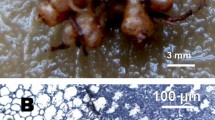Abstract
Recent genomic studies indicate that the diversity of the so-called Candidate Phyla Radiation (CPR) comprises approximately 26 percent of the entire catalogued biodiversity. These bacteria are characterized by small cell-size and a reduced metabolism. In this review, we provide a short overview of their diversity and ecological distribution, particularly with respect to the human microbiome. We finally summarize cultivation attempts and known symbioses and provide insights into their known metabolism.
Similar content being viewed by others
Literatur
Hugenholtz P, Goebel BM, Pace NR (1998) Impact of culture-independent studies on the emerging phylogenetic view of bacterial diversity. J Bacteriol 180:6793–6793
Brown CT, Hug LA, Thomas BC et al. (2015) Unusual biology across a group comprising more than 15 % of domain Bacteria. Nature 523:208
Castelle CJ, Banfield JF (2018) Major new microbial groups expand diversity and alter our understanding of the tree of life. Cell 172:1181–1197
Parks DH, Rinke C, Chuvochina M et al. (2017) Recovery of nearly 8,000 metagenome-assembled genomes substantially expands the tree of life. Nat Microbiol 2:1533–1542
Hug LA, Baker BJ, Anantharaman K et al. (2016) A new view of the tree of life. Nat Microbiol 1:16048
Probst AJ, Ladd B, Jarett JK et al. (2018) Differential depth distribution of microbial function and putative symbionts through sediment-hosted aquifers in the deep terrestrial subsurface. Nat Microbiol 3:328–336
Luef B, Frischkorn KR, Wrighton KC et al. (2015) Diverse uncultivated ultra-small bacterial cells in groundwater. Nat Commun 6:6372
Kowarsky M, Camunas-Soler J, Kertesz M et al. (2017) Numerous uncharacterized and highly divergent microbes which colonize humans are revealed by circulating cell-free DNA. Proc Natl Acad Sci USA 114:9623–9628
He X, McLean JS, Edlund A et al. (2015) Cultivation of a human-associated TM7 phylotype reveals a reduced genome and epibiotic parasitic lifestyle. Proc Natl Acad Sci USA 112:244–249
Starr EP, Shi S, Blazewicz SJ et al. (2018) Stable isotope informed genome-resolved metagenomics reveals that Saccharibacteria utilize microbiallyprocessed plant-derived carbon. Microbiome 6:122–122
Gong J, Qing Y, Guo X et al. (2014) “Candidatus Sonnebornia yantaiensis”, a member of candidate division OD1, as intracellular bacteria of the ciliated protist Paramecium bursaria (Ciliophora, Oligohymenophorea). Syst Appl Microbiol 37:35–41
Castelle CJ, Brown CT, Anantharaman K et al. (2018) Biosynthetic capacity, metabolic variety and unusual biology in the CPR and DPANN radiations. Nat Rev Microbiol 16:629–645
Imachi H, Nobu MK, Nakahara N et al. (2019) Isolation of an archaeon at the prokaryote-eukaryote interface. bioRxiv 726976, doi: 10.1101/726976
Author information
Authors and Affiliations
Corresponding author
Additional information
Indra Monsees 2013–2018 Bachelor- und Masterstudium Water Science an der Universität Duisburg-Essen. Seit 2019 Promotion in der Fakultät Chemie, Universität Duisburg-Essen.
Andreas Klingl 2001–2007 Biologiestudium an der Universität Regensburg, dort 2007–2011 Promotion. 2011–2014 Postdoc an der Universität Marburg. Seit 2014 Professor (W2) an der LMU München.
Alexander Probst 2004–2010 Biologiestudium an der Universität Regensburg. 2010 wissenschaftlicher Mitarbeiter am Lawrence Berkeley National Laboratory, USA. 2011–2014 Promotion an der Universität Regensburg und Bioinformatiker bei Second Genome, South San Francisco, USA. 2014–2017 Postdoc an der University of California, Berkeley. 2017–2018 Vertretungsprofessor, seit 2018 Professor (W2) an der Universität Duisburg-Essen.
Rights and permissions
About this article
Cite this article
Monsees, I., Klingl, A. & Probst, A.J. Kleine Zellen, große Wirkung — Bakterien der Candidate Phyla Radiation. Biospektrum 25, 719–721 (2019). https://doi.org/10.1007/s12268-019-1304-7
Published:
Issue Date:
DOI: https://doi.org/10.1007/s12268-019-1304-7




